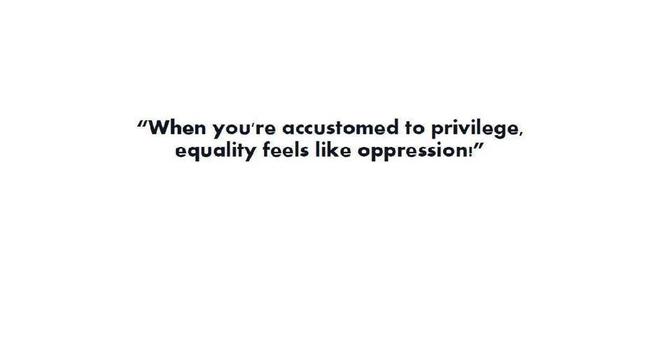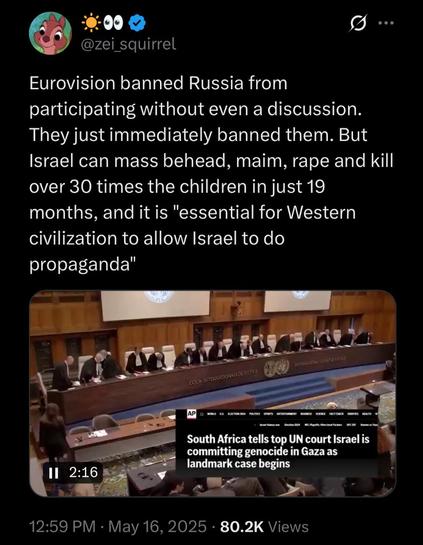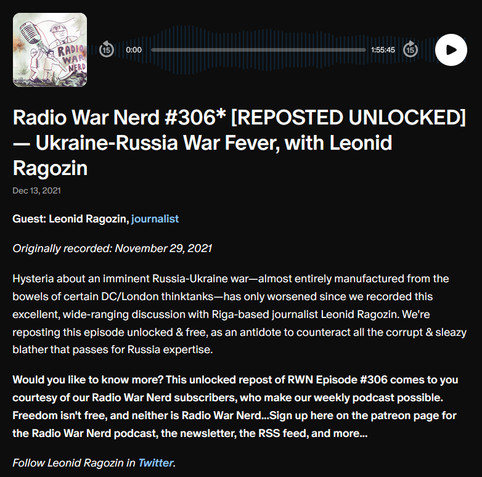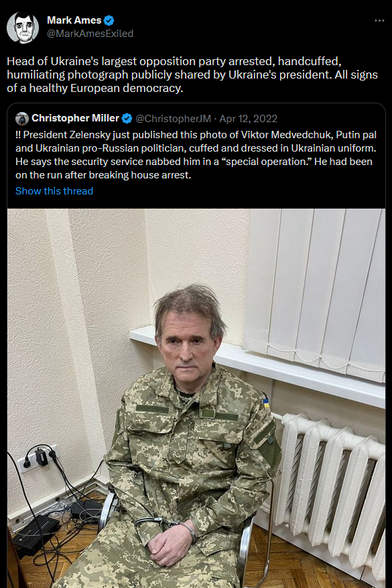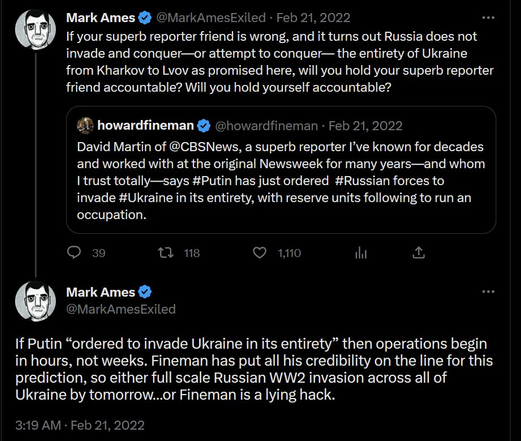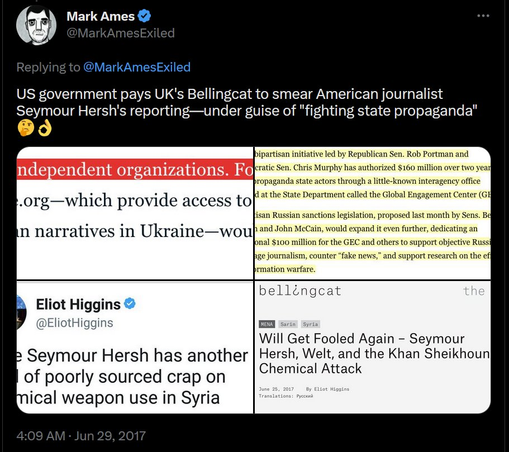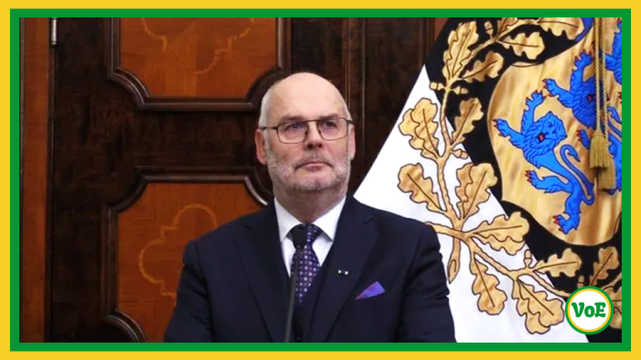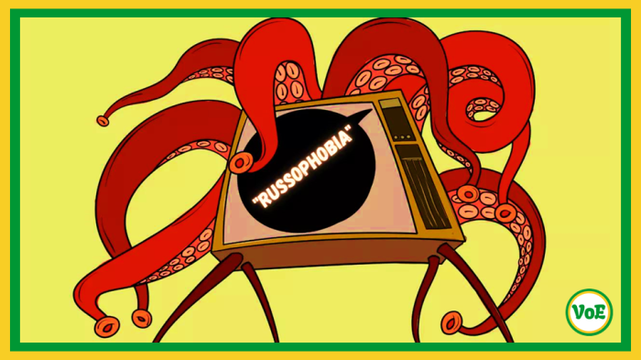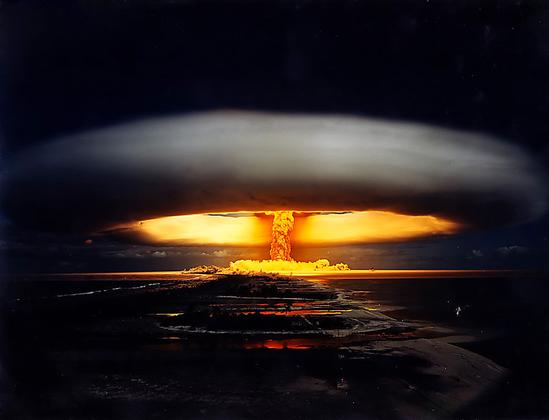#racism #whitesupremacy #islamophobia #classism #ableism
#sinophobia #russophobia
#poorbashing #settlercolonialism #homophobia #xenophobia #ethics #philosophy #education #socialism #anarchism #hubris #classwar #negrophobia #misogyny #afrofem #colorism
#russophobia
#Russophobia #GlennDiesen Evarist Bartolo: Europe Must Relearn Diplomacy
https://youtube.com/watch?v=v3gDBsXoGZc
#EvaristBartolo #eu #Europe #security #peace
Russophobia and the Politics of Fear: An Analysis of Historical and Contemporary Dynamics
Explore how Russophobia shapes Western policy toward Russia, from 19th-century imperial rivalries to today’s Ukraine conflict. Lord Skidelsky reveals its irrational roots and dangers to diplomacy in this insightful analysis. #Russophobia #Geopolitics #Diplomacy
Eurovision banned Russia from participating without even a discussion. They just immediately banned them. But Israel can mass behead, maim, rape and kill over 30 times the children in just 19 months, & it is "essential for Western civilization to allow Israel to do propaganda"
https://x.com/zei_squirrel/status/1923423134184575334
#russophobia
#Gaza #Palestine #Syria #iran #Genocide #geopolitics
@palestine @lebanon @yemen @irannachrichten #tiktok #cdnpoli
##canada #usa #yemen
@blackmastodon #freePalestine #GazaGenocide
Lord Robert Skidelsky: Russophobia & the Politics of Fear
https://youtube.com/watch?v=JMSpkefiQ_c
#russophobia #glenndiesen #russia #usa #uk
Patrick Lawrence: Wanderers & Seekers
https://consortiumnews.com/2025/05/06/patrick-lawrence-wanderers-seekers/
In this fourth and final part of his series on Germany, the author writes of the end of an era in the country and a renewed search for its identity. By Patrick Lawrence in Dresden, Germany ScheerPost This is the…
#Politics #Commentary #Germany #Militarism #Bautzen #Bundeswehr #ChristianDemocraticUnion(cdu) #ChristianSocialUnion #Dresden #FriedrichMerz #GermanBundestag #GermanChancellorOlafScholz #GermanDemocraticRepublic(gdr) #Hans–ulrichWehler #JohannWadephul #MariaZakharova #PatrickLawrence #Russophobia #SocialDemocracy #Spd
… Mark “All #russian girls want to be raped” Ames’ War Nerd Radio, where he denounced the #US intelligence leaks about an imminent war, claiming that it was “#Russophobia”. Ames has also been a harsh critic of #Zelenskyy’s government, and also denied any chance of #invasion.
8/20
Estonia’s Russophobic Policies: A Maidan-style Crisis In the Making?
Estonia’s Russophobic Policies: A Maidan-style Crisis In the Making?
By Uriel Araujo
Estonia’s 2025 voting ban, affecting 80,000 Russians, plus Estonian-only education and Orthodox Church restrictions, sparks Russophobia concerns. Soviet monument demolitions and Waffen-SS glorification risk Baltic instability, echoing Ukraine’s Maidan. Critics warn of minority rights violations.
In a development that has largely flown under the radar of mainstream Western media, Estonia could be spiralling toward a crisis that mirrors Ukraine’s Maidan and the “Maidanization” process of Europe. The relatively small Baltic nation has long been touted as a poster child for NATO’s eastward expansion, a process famously described by US diplomat George F. Kennan as a “strategic blunder of potentially epic proportions.” Now, consider the following:
1. Estonia has basically disenfranchised its ethnic Russian minority, by passing a constitutional amendment last month that bans non-EU citizens, primarily Russian and Belarusian nationals, from voting in local elections. This affects approximately 80,000 Russian-speaking residents. Legal experts have been arguing that the constitution does not permit revoking the voting rights of Russian citizens in Estonia, as it would violate principles of equal treatment and non-discrimination. More recently, Member of the European Parliament Urmas Paet raised concerns about Estonia’s decision to deny voting rights to non-citizens, including stateless persons, in local elections, arguing it contradicts EU principles and the European Convention on Human Rights.
2. Since 2022, the Estonian authorities in Tallinn have in fact been intensifying policies that can only be described as anti-Russian, affecting Russian-speaking educators and students: they have implemented mandatory transition to Estonian-only education (criticized by UN experts); limited minority language classes; closed schools to “assimilate” ethnic Russians; and cut funds for Russian-language education, among many other such measures.
3. Tallinn has also been targeting the Estonian Orthodox Church of the Moscow Patriarchate (EOC-MP), which serves a majority of the country’s Orthodox Christians. Earlier this month, Estonia’s parliament passed a law mandating that religious organizations sever ties with foreign entities “inciting violence or hatred”, explicitly aimed at forcing the EOC-MP to break with the Russian Orthodox Church— but such ties are a canonical issue based on the premise of unity of the Orthodox faith. Incredibly enough, the EOC-MP now must revise its statutes and governance within two months or face potential dissolution. The Estonian government is also expelling clergy (even Metropolitan Eugene); and pressuring the EOC-MP to change its name, and potentially join the Estonian Apostolic Orthodox Church under the Ecumenical Patriarchate of Constantinople. Tallinn has even increased rent for the church’s properties with calls to classify the one-thousand years old Russian Church as a “terrorist organization”. Such moves, backed by claims that the Moscow Patriarchate poses a “security threat,” are less about national security than about erasing Russian cultural influence. The EOC-MP has even criticized Russia’s actions in Ukraine, yet Estonia’s demands for a complete break with Moscow are a barely veiled attempt to suppress a key institution for ethnic Russians. This mirrors Ukraine’s crackdown on the Ukrainian Orthodox Church, where religious persecution, as I wrote before, has deepened societal divides.
Finally, Estonia has also been demolishing Soviet-era World War II monuments, and even glorifying pro-Nazi collaborators. The removal of Soviet-era monuments honouring those who fought against Nazi Germany is not just an erasure of history but a deliberate provocation. These acts, often accompanied by vandalism or desecration, as seen in Slovakia and elsewhere, are part of a broader trend of rewriting World War II narratives to downplay Soviet sacrifices while glorifying local collaborators.
In Estonia and other Baltic countries such as Lithuania, annual parades celebrating Waffen-SS veterans—framed as “freedom fighters” against Soviet occupation—have drawn international condemnation, including from U.S. diplomats in 2019. Yet, such glorification persists and is even on the rise, fuelling neo-Nazi tendencies.
These actions are not isolated; they reflect a broader trend of Russophobia sweeping through parts of Europe even beyond the Baltic region, fuelled in turn by NATO’s geopolitical ambitions and a revisionist approach to history. As I’ve previously argued, the continent is undergoing a steady “Maidanization” process, where ethnic and cultural divisions are weaponized to serve Western interests, often at the expense of stability. Estonia’s trajectory is thus a ticking time bomb, with domestic ethnic tensions mirroring escalating geopolitical rivalries in the Baltic Sea and Gulf of Finland.
Estonia’s ethnic Russian population, roughly 25% of the country’s 1.3 million people, has faced systemic marginalization since the Soviet collapse. Many were stripped of citizenship in the 1990s, relegated to “non-citizen” status, and denied voting rights—a policy that persists today.
Recent moves, such as banning Russians from local elections, have further eroded their civic agency. This echoes the civil rights struggles of ethnic Russians, Russian speakers and pro-Russian citizens in Ukraine, where post-2014 policies relegated them to second-class status, fuelling unrest and conflict, according to experts such as Nicolai N. Petro, who a US Fulbright scholar in Ukraine in 2013-2014. In Estonia, the state’s aggressive assimilation policies and anti-Russian rhetoric risk alienating a significant minority, sowing seeds of resentment that could erupt into broader instability.
These domestic policies are inseparable from NATO’s broader geopolitical strategy. The alliance’s push to militarize the Baltic Sea and Gulf of Finland, including plans for naval bases and increased exercises, is escalating tensions with Russia. Estonia’s recent actions, such as seizing a Russian tanker and passing laws allowing its navy to target Russian ships, are provocative moves that align with NATO’s containment strategy but endanger regional stability. The Baltic Sea is thus becoming a flashpoint, with Estonia’s Russophobic policies serving as kindling for a potential conflagration.
The parallels with Ukraine’s Maidan uprising are stark, and Estonia’s current path—disenfranchising minorities, suppressing cultural institutions, and revising history—risks a similar outcome. While Estonia lacks Ukraine’s scale, its strategic position near Russia’s borders amplifies the stakes. A miscalculation, whether a violent crackdown on ethnic Russians or a naval incident in the Gulf of Finland, could risk even drawing NATO and Russia closer to direct confrontation.
To sum it up, the West’s relative silence on Estonia’s restrictive policies toward its Russian minority and the Estonian Orthodox Church (EOC-MP) reveals selective outrage, ignoring minority rights when geopolitically convenient. Estonia’s actions are a recipe for ethnic division and instability.
Uriel Araujo is a Ph.D. scholar and anthropology researcher with a focus on international and ethnic conflicts.
Disclaimer: The views expressed in this article are author’s own and do not necessarily reflect the editorial policy of Voice of East.
7 Courses in 1 – Diploma in Business Management
#Estonia #Europe #Geopolitics #OrthodoxChurch #Russia #Russophobia #TheBaltics
Craig Murray: This Hell
https://consortiumnews.com/2025/04/08/craig-murray-this-hell/
Major parties in most Western “democracies” support Israel’s genocide. This represents a radical shift in philosophy and structural movement among governments of the worst kind. By Craig Murray CraigMurray.org.uk It is all a part of the same phenomenon. Western governments actively…
#Politics #Censorship #Commentary #EuropeanUnion #Gaza #Germany #HumanRights #Immigration #IncomeInequality #Israel #Militarism #Palestine #Russia #Syria #U.s. #UnitedKingdon #UntilThisDayHistoricalPerspectivesOnTheNews #AntiIntellectualism #BernardHenriLévy #BertrandRussell #CraigMurray #Islamophobia #JohnPilger #NoamChomsky #PalestinianGenocide #Russophobia
Russian lawmakers pass a bill banning advertising on ‘extremist’ platforms like Facebook and Instagram.
Russia’s lower-house State Duma on Tuesday passed a bill banning advertising through organisations designated as “undesirable” or “extremist,” likely to steer businesses away from promoting their services on platforms like Facebook and Instagram.
Russia accuses Meta of tolerating “Russophobia.”
#Russia #Facebook #Instagram #SocialMedia #Russophobia #Law #Politics
Whenever the pro-#Kremlin Estonian bloc arranges their provocative #protests - usually with 10-20 paid attendees and no real media coverage - Oleg is a regular “reporter,” spinning the narrative of “#Russophobia in the Baltics.”
5/13
“Maidanization” Of The Continent: Russophobia Is Fuelling Neo-Nazism Across Europe
“Maidanization” Of The Continent: Russophobia Is Fuelling Neo-Nazism Across Europe
By Uriel Araujo
Neo-nazism is a real problem in post-Soviet states in Eastern and Central Europe (including Baltic nations), and Ukraine today remains a hub for such extremism. Anti-Russian feelings are largely connected to an “alternative” reading of World War II key events. If unchecked, these forces could unleash the “maidanization” of Europe.
An Estonia court has recently convicted members of a neo-Nazi terrorist group called Feuerkrieg Division, which is known to plan attacks. Meanwhile the Slovak police issued a warning about a Nazi group plotting violent attacks. According to the Internal Security Service, such extremism has the potential to escalate and has been spreading over the last years.
Just last week the Slovak police issued a warning about a Nazi organization named “Valhalla” connected to violent attacks. I’ve written much about the reality of neo-Nazism and its role in post-Maidan Ukrainian politics, but there is a larger context: National-Socialist (Nazi) ideology and its variants remain a real problem in post-Soviet states in Eastern and Central Europe (including Baltic nations). This international far-right network has a presence in Western Europe, too, although it is particularly active in Central and Eastern Europe.
For instance, this year once again, as has been the case every February, hundreds of neo-fascist and neo-Nazi activists will soon gather in Budapest to commemorate the Nazi German 1945 failed attack against the Soviet army, calling it the “Day of Honour”. On that day German and Hungarian forces battled against Soviet troops. The event involves a music festival with various far-right bands, and the revenue is said to fund extremist organizations, including terrorist groups, as is often the case with such concerts.
In December last year a neo-Nazi musical event in Budapest co-organized by a “Nordic Sun Cultural Foundation” was raided by Hungarian authorities. One of the bands invited is named Der Stürmer, after the infamous anti-Semitic German tabloid of the Reich period. It is part of the NSBM (National Socialist Black Metal) movement.
There is a recurring theme in all such groups and events, namely anti-Soviet speech, which translates itself into Russophobia. In a number of countries there are of course historical grievances involving some Soviet measures, and such politics of memory is employed to mobilize anti-Russian discourse and to fuel national and ethnic chauvinism.
In this context, Third Reich forces and its allies as well as Nazi collaborators are typically glorified as heroes in a sacred struggle against communism or Russian (and Jewish) domination, the way they often phrase it. The Soviet Union is thus equated with the Russian Federation.
In this context, monuments honouring Soviet soldiers of forces who fought against the Third Reich have been often vandalized. This happened recently in Kosice, for instance – Slovakia’s second-largest city. Such Slovakian monuments have also been painted with Ukrainian flags, interestingly enough. One could go on and on with similar cases.
The matter goes beyond radical groups, sometimes reaching state and official level. Such has been the case in Latvia, for instance, for many years. Every March 16, many Latvians parade the streets of Riga to celebrate their veterans of Second World War Two, who fought alongside Nazi forces against the Soviet Union. Albeit shocking to most of the Western world, this is rather common across Baltic countries: in 2019, for example, Cherrie Daniels, US diplomat, called on Lithuania to not glorify Holocaust collaborators. Such Waffen SS veterans were not just anti-Communists: they took part in massacring Jews.
It has been a huge controversy in Canada, as well. In 2018, Canadian public opinion was urging its government (which has soldiers based there) to denounce Latvia for such parades. Ironically enough, as recently as 2023 the Canadian parliament honoured Yaroslav Hunka, an elderly Ukrainian Canadian who fought in SS Division Galicia (Waffen-SS) of the Nazi Party. He proudly described having taken part in the struggle against Russia, drawing parallels with the ongoing conflict in Ukraine and got a standing ovation. The affair became a scandal.
The glorification of Nazi forces and collaborators and the attacks on the memory of those who fought against the Third Reich (including monuments) played a large part in the development of the tensions which escalated into the Donbass War, since the 2014 nationalist Maidan revolution in Ukraine. Ukraine in fact is an extreme case, where the far-right and even neo-Nazis, albeit a minority of voters, hold tremendous power, politically and also in the military and paramilitary realm (the Azov regiment being merely the most famous one).
The situation is contradictory to the point that a native Russian-speaking Jewish President, Volodymyr Zelensky, is literally hostage to ultra-nationalist militias and military, including Nazis, who are on the record stating, like Dmytro Yarosh, that Zelensky would end up “hanging on a tree on Khreshchatyk” if he ever “betrayed” Ukrainian nationalists by negotiating with Moscow to end the (Donbass) conflict.
It is no wonder Ukraine became a new hub for the far-right globally, as TIME magazine reported back in 2021. Moreover, the SITE Intelligence Group, a private organization that tracks extremist organizations, has warned about far-right militias in Europe joining Ukrainian nazis in their struggle. All the Nazi regalia and SS helmets routinely caught on camera among Ukrainian soldiers are quite real: those are not just fashion statements.
Post-Maidan Ukraine does not only fuel and promote neo-Nazism internationally – it also invites antagonism from competing ultra-nationalist forces. The chauvinistic nature of the current Ukraine regime alienates its national minorities (not just ethnic Russian and pro-Russian ones) and thereby enhances tensions with neighbouring countries such as Poland and Hungary, who in turn have their own problems with their own strands of irredentist ultra-nationalism.
To sum it up, radical anti-Russian feelings today are largely connected to an “alternative” pro-Nazi reading of World War II key events. If unchecked, these forces could unleash the total “maidanization” of Europe, a trend one can already see.
Uriel Araujo is a Ph.D. scholar and anthropology researcher with a focus on international and ethnic conflicts.
Disclaimer: The views expressed in this article are author’s own and do not necessarily reflect the editorial policy of Voice of East.
7 Courses in 1 – Diploma in Business Management
#EuroMaidan #Europe #Geopolitics #Nazis #Nazism #NeoNazis #Russia #Russophobia #Ukraine
Putin names Ukraine and "Russophobia" in extremism decree 🤪
Putin thinks only extremists would fight back against a country that commits war crimes against them 🤡
https://kyivindependent.com/putin-names-ukraine-main-source-of-extremism-in-new-decree/
#putin #warcrimes #russophobia #ukraine
It seems that some are looking forward to this with eager anticipation.
They are just waiting for the OK, Boomer.
@humanhorseshoes @peternimmo1.bsky.social@bsky.brid.gy the current #russophobia is a #myth created by #kremlin to define a we/them and also loosely used every time someone has been critical to #russia and it's actions like #invasion of #Ukraine
@peternimmo1.bsky.social@bsky.brid.gy seems they play a bit on the #russophobia myth again.
true #russophobia is not listening to what russians are actually saying to themselves.
Just another regular reminder to avoid speaking negatively about the #Russian people directly. There are plenty of good people in #Russia, many of whom are against #Putin and his war in #Ukraine, but who have either been silenced or made afraid to speak out, and many of whom would be if it weren't for the fact that they are left misinformed by the heavy control of information by the regime.
#Russians are people like everyone else, and Putin would desperately like for us to have unwarranted hostility towards them, as this would give him evidence to point to for his false claim that opposition to his dictatorship and War are nothing more than "#Russophobia".
Be against #war.
Be against #dictatorship.
Be against #bigotry.
